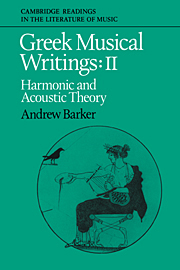Book contents
- Frontmatter
- Contents
- Acknowledgements
- Abbreviations, texts and typographic conventions
- Introduction
- 1 Pythagoras and early Pythagoreanism
- 2 Plato
- 3 Aristotle
- 4 The Aristotelian Problemata
- 5 The Peripatetic De Audibilibus
- 6 Theophrastus
- 7 Aristoxenus
- 8 The Euclidean Sectio Canonis
- 9 Minor authors quoted by Theon and Porphyry
- 10 Nicomachus
- 11 Ptolemy
- 12 Aristides Quintilianus
- Bibliography of works by modern authors
- Index of words and topics
- Index of proper names
2 - Plato
Published online by Cambridge University Press: 06 January 2010
- Frontmatter
- Contents
- Acknowledgements
- Abbreviations, texts and typographic conventions
- Introduction
- 1 Pythagoras and early Pythagoreanism
- 2 Plato
- 3 Aristotle
- 4 The Aristotelian Problemata
- 5 The Peripatetic De Audibilibus
- 6 Theophrastus
- 7 Aristoxenus
- 8 The Euclidean Sectio Canonis
- 9 Minor authors quoted by Theon and Porphyry
- 10 Nicomachus
- 11 Ptolemy
- 12 Aristides Quintilianus
- Bibliography of works by modern authors
- Index of words and topics
- Index of proper names
Summary
Plato's dialogues were written during the first fifty years of the fourth century. They are full of allusions to music, and several reflect at length on its aesthetic qualities, its effects on human character and emotion, and its uses as an instrument of educational and social policy. Some of the central passages concerned with these matters are collected in GMW vol. 1 ch. 10. His writings also contain discussions of harmonic theory, both actual and ideal, and apply musical ideas to the study of the structure of the universe. His investigations of the nature of the material world, in the Timaeus, include remarks about the physical basis of sound and our perception of it. The most important of these are translated in the present chapter.
In the Republic, after presenting his views about the proper organisation of the city-state, and introducing his famous conception of the ‘philosopher-ruler’, Plato proceeds in Book VII to consider the form that the intellectual education of these rulers should take (their physical and moral training has already been discussed). The studies he prescribes are mathematical, on the grounds that these are best suited to the task of elevating the mind from a concern with what is perceived to an investigation of more fundamental realities, those that are intelligible but not perceptible. Five branches of mathematics are distinguished: number-theory, plane geometry, solid geometry (‘stereometry’), astronomy and harmonics.
- Type
- Chapter
- Information
- Greek Musical Writings , pp. 53 - 65Publisher: Cambridge University PressPrint publication year: 1990

